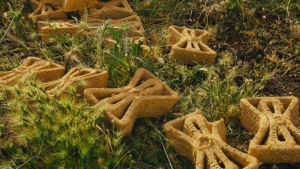First Published in

*Term used to denote a single storey, single room hostel in a section of the old township (Lokishini) of Langa where single men newly arrived from the rural areas to seek work in the big city lived until the mid 1980s.
It is perhaps bold of me to propose that I understand the phrase ‘frame of reference’ enough to use it as an introduction to an article about people’s homes. It is maybe even bolder for Taweni to think that I will be able to get across the connection between the two in such a short literary space, and because I have a layman’s understanding and application of interior décor (my last flat being a testament to the fact that, while I have a penchant for things homely and decorative, I don’t necessarily have any idea how to combine them.) I do know, however, that I view the world through a specific ‘frame of reference,’ a set of interchangeable lenses that influence the way I negotiate my place in and out of the social spectrum. My set of lenses is influenced largely by two clashing forces: I grew up in the townships of Langa and Guguletu but I have assimilated aspects of American and European cultures which are the worlds I live and work in (a day-to-day ‘reality filter’ fast becoming a stereotype in South Africa). So my concept of ‘home’ is influenced by these two (very different) perspectives.
My duality is simultaneously conscious and subconscious and I find myself at times in an uncomfortable position where I am an outsider in both worlds that I occupy. For example, if I were to buy a car it would be either a 1975 Karmann Ghia, an coupe Mercedes Benz manufactured in the 1950s, or a Porsche from the same era - choices my peers might find strange as these are ‘old’ cars. They would prefer the latest Golf, BMW or Porsche which are more ‘acceptable’ signifiers of success and wealth. Perhaps this tendency to overstatement comes from our desire to escape the poverty that we grew up in. I understand this fully because I share that common background, yet I am an outsider in that my world-view is constructed differently because of my education and socialisation.
I visited Langa for the overriding reason that, unlike Guguletu or Khayelitsha, it can still be described as quaint, safe and conservative. If townships had a character and flavour like food and places that sell food, then Guguletu would be a very trendy eating spot, where they served a combination of Sushi, African and Cuban cuisine. Khayelitsha would be the fast food café on the street corner where food, alcohol and convenience goods are all sold at discount prices. Langa could not be a restaurant. It would have to be good home cooking (food like mqusho[1]*, meat with rich gravy and potatoes, butternut and umfino [2]*.)
Perhaps it is the people who live there, perhaps it’s just in the air, but Langa evokes a feeling, in me, of home, so I figured that this is where I would find not only my “God Bless” décor but also a concept of home that is part of my frame of reference.
(I have named the popular wall hangings “the God Bless hangings” as I am yet to meet someone who knows what they are actually called. This particular class symbol is inherited from the 1960s when the adoption of western elements of décor was the domain of the educated black middle class. As the symbols of class evolved and the black proletariat adopted them, the wall hangings became an integral part of the black identity. What better way to display your education than to have it hanging, polished and framed, in your living room?)
No. 83 Special Quarters, in the old part of Langa, the home of Girlie and Mcitwa Ndaba, is exactly two rooms (a living area and bedroom) constantly overflowing with people. As I stood in the doorway, scanning the faces of the three adults and four children sitting around, I was amazed that all these people could live in such a small space. The house reminded me of my grandmother’s because of the décor, the smell and feeling of home, especially at meal times. We would sometimes dish up twenty-five plates of food everyday depending on how many uncles, cousins and friends where staying with us. It was also not strange for our next-door neighbours to eat there, and so meal times were not an organized quiet time but a chaotic, active, very loud feast. Visitors were always welcome. There was even a man (our ‘gossip journalist’ as we called him) who would magically drop by about twenty minutes before meal times everyday for a week then we wouldn’t see him for about two weeks. We later discovered that he visited four of our other neighbours around meal times as well. He had us all on a weekly cycle.
My grandmother had a habit of covering everything to preserve it. Bright plastic lined kitchen cupboards and every drawer in her house and there was a strip of hard, clear plastic stretching from the front door to the back covering the carpet. When I forgot to replace it one day after cleaning the house, she explained, while giving me the hiding of my life, that it was to a keep her carpet clean and to prevent it from wearing thin.
But back to No.83 Special Quarters in Langa. Girlie and Mcitwa have lived in this very colourfully decorated house for eleven years. The floors of the lounge (cum dining room, cum kitchen) are covered with red and yellow tapuit (linoleum). The walls are painted candyfloss pink and are covered with family photographs and God Bless hangings. Pale pastel curtains rest on the back of a dark blue sofa, opposite a hard wood bench. The bench leans on the kitchen cupboards, which are spotlessly clean. The new stove and Defy fridge seem out of place, and they frame shiny silver cooking utensils hanging on the wall. Kenny G plays in the background, triggering in me thoughts of serene expansive country landscapes, an image completely at odds with our locale.
Even though most of the internal décor elements are typical of any home in the township, the God Bless wall hangings are very specific to a religious household. Girlie and Mcitwa Ndaba are ZCC (Zion Christian Church) members. Warm, humble and proud, they immediately make us feel welcome even though we have just barged into their house and are taking photos of everything. Eschewing other mass produced English language wall hangings, she has made these herself. She chose these texts specifically because they express her values and beliefs; “Akwaba uThixo angasiva isicelo sam, andi phendule” is an inspirational phrase asking God to hear one’s wishes and answer them.
“This home,” Mcitwa says, “is a home for my children. Because there are people who do not have anything, not even a place to sleep. If something happens they have nowhere to turn. My children can say ‘I have a place to sleep.’”
He tells me with pride how important guests, whether relatives or strangers, are to building happiness in a home. “If there are never any visitors, that is not a home. A person can come here and say that ‘my load will be lightened should I have a problem because this is a home.’ It is the love in the home that builds it and that is what makes us happy.”
He has the photo albums to prove how many guests he has welcomed into the house and it is easy for me to reconcile his words with my surroundings. I am sitting on their bed, the most private room of any house, and am a couple of steps to the kitchen, dining room, lounge and front door.
Mcitwa convinces me that even if he were to win the lottery, the essence of his new home would not be any different. “A family can’t really live in a two bedroom house, even though I have extended (added on) this house from one room. But I would not change the rules of God that govern my home.”
We expect that poverty overrides happiness but this is not the case. In this house, it is clearly not the material possessions that make it rich. There is genuine generosity that makes it very wealthy.
[1] Traditional Xhosa meal of samp and beans (staple food/meal)
[2] Traditional Xhosa vegetable dish with spinach & mielie meal (or potatoes)
Photographs by Anne Morgenroth.






